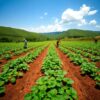Quality seedlings are the foundation of successful farming. They are essential for growing crops and maximizing yields. These carefully chosen and certified plants have superior genetics, disease resistance, and growth traits that directly impact harvests.
Smallholder farmers in low and middle-income countries are crucial to global food production. They cultivate 80% of farmland in Asia and Africa. These farmers usually have less than 2 hectares of land, so they must use their resources efficiently to survive and thrive.
The connection between quality seedlings and smallholder success is significant:
- Higher Crop Yields: Premium seedlings can double or triple harvest volumes
- Better Product Quality: Superior seeds produce crops that command higher market prices
- Reduced Crop Losses: Quality varieties minimize losses from pests and diseases
- Improved Adaptability: Selected seedlings are better suited to withstand challenging weather conditions
Studies show that access to quality seedlings can increase smallholder incomes by 50-100%, transforming subsistence farming into profitable agricultural businesses. This economic boost has a positive impact on food security and living standards in rural communities.
The Role of Quality Seedlings in Smallholder Agriculture
Quality seedlings are certified plant materials that meet specific standards in terms of genetics, physical attributes, physiology, and health. These seedlings have important qualities such as:
- High germination rates (usually above 85%)
- Resistance to diseases
- Genetic purity
- Consistent growth patterns
- Ability to adapt to local conditions
The Impact of Quality Seedlings on Crop Yields
The effect of using quality seedlings on crop yields is significant. Studies indicate that using certified seeds can result in a 20-30% increase in harvests compared to traditional varieties. This directly impacts the income potential of smallholder farmers.
Barriers Smallholder Farmers Face in Accessing Quality Seedlings
Smallholder farmers encounter major obstacles when it comes to accessing these crucial agricultural inputs:
Limited Availability
- Insufficient distribution networks in rural areas
- Seasonal scarcity during peak planting times
- Distance from certified seed producers
Cost Constraints
- Premium prices for certified seeds
- Limited access to credit facilities
- High transportation costs to reach seed suppliers
Strategic Improvements Needed in Existing Seed Systems
To tackle these challenges, strategic enhancements are necessary in the current seed systems:
Local Seed Production
- Training local farmers in seed multiplication techniques
- Establishing community seed banks for storage and distribution
- Creating decentralized seed testing facilities for quality assurance
Market Infrastructure Development
- Building strong distribution networks to ensure timely delivery of seeds
- Implementing price control mechanisms to make certified seeds affordable
- Supporting local agro-dealers in promoting and selling quality seeds
Quality Control Measures
- Regular monitoring and evaluation of seed producers’ practices
- Standardized certification processes for all seed varieties
- Conducting field inspections during growing seasons to verify quality
Seed Certification Systems and Their Economic Benefits
Seed certification systems are quality control mechanisms that protect farmers’ investments and ensure agricultural productivity. One such system, the Quality Declared Seed (QDS) system, stands out as a practical approach to seed quality assurance, especially in developing regions.
How QDS Certification Works
Under QDS certification, designated inspectors conduct thorough inspections of both the fields where seeds are grown and laboratories where tests are performed. These inspections aim to verify several key aspects of seed quality:
- Genetic purity: Ensuring that the seeds being produced are true to type and have not been crossbred with other varieties.
- Physical cleanliness: Checking that the seeds are free from any foreign matter or debris that could affect their quality.
- Germination rates: Assessing how many seeds are likely to sprout and grow into healthy plants.
- Disease-free status: Verifying that the seeds do not carry any diseases or pests that could harm crops.
Benefits for Farmers
The certification processes established by QDS create a reliable seed supply chain where farmers can trust the quality of their purchased seeds. This trust is built on the knowledge that rigorous inspections and tests have been conducted to ensure compliance with established standards.
To maintain this level of quality assurance, the system requires seed producers to keep detailed records of various aspects related to their operations:
- Seed source documentation: Keeping track of where the seeds used for production originated from.
- Field history: Documenting information about previous crops grown on the same land.
- Production practices: Recording specific methods employed during cultivation, such as fertilization techniques or pest control measures.
- Quality control measures: Outlining steps taken to monitor and maintain seed quality throughout the production process.
Economic Impact on Farming Communities
The economic benefits resulting from certified seed systems extend beyond individual farmers; they have a positive ripple effect throughout entire farming communities.
Direct Benefits
Certified seed systems bring about several direct advantages for farmers:
- Higher crop yields: On average, crops grown from certified seeds yield 20-30% more compared to those grown from non-certified or traditional seeds.
- Premium prices: Farmers who produce certified seeds can command higher prices in the market due to their superior quality.
- Reduced risks: By using disease-resistant varieties and improved agronomic practices associated with certified seeds, farmers can mitigate the risks of crop failures caused by pests or adverse weather conditions.
Market Advantages
In addition to benefiting individual farmers directly, certified seed systems also contribute to broader market dynamics:
- Increased buyer confidence: Buyers (such as wholesalers or exporters) are more likely to purchase produce when they know it has been grown using certified seeds, which assures them of its quality.
- Access to formal markets: With certification serving as proof of quality, farmers gain entry into formal markets where they can sell their produce at better prices compared to informal channels.
- Higher market value: The reputation built around certified seed systems elevates the overall market value of crops produced within those regions.
Entrepreneurial Opportunities for Smallholder Farmers
Certified seed systems also create entrepreneurial opportunities for smallholder farmers who become specialized seed producers. These farmer-entrepreneurs generate additional income by producing and selling quality-assured seeds to their communities, establishing sustainable local seed businesses.
By diversifying their income sources through seed production alongside traditional farming activities, these smallholders enhance their resilience against economic shocks while contributing towards local food security efforts.
Success Stories from QDS Implementation
The QDS system has proven particularly successful in regions where formal seed certification infrastructure is limited. By implementing localized quality control measures tailored specifically for those areas:
- Informal seed exchanges can be strengthened by introducing elements such as record-keeping practices or training programs aimed at improving farmer knowledge about best production techniques.
- Fully commercialized seed markets may emerge gradually over time as demand increases for high-quality inputs among smallholder farmers who wish to enhance productivity levels on their farms.
These success stories highlight how innovative solutions like QDS can play a crucial role in bridging gaps within existing agricultural systems while empowering local communities economically.
Case Study: Quality Declared Seed System in Tanzania
Tanzania’s implementation of the Quality Declared Seed (QDS) system stands as a remarkable success story in agricultural development. The system has transformed seed production and distribution, particularly benefiting smallholder farmers growing common beans and groundnuts.
Key Implementation Highlights:
- Local farmer groups receive specialized training in seed production
- Regular field inspections ensure adherence to quality standards
- Simplified certification process reduces costs while maintaining quality
- Direct seed marketing within communities enhances accessibility
The QDS system has created significant economic opportunities for participating farmer groups. Data from the Lake Zone region shows farmer groups producing up to 1,200 kg of quality bean seeds per season, selling at premium prices 20-30% higher than regular grain prices.
Production and Income Impact:
- Average yield increases of 35-40% for common beans
- Groundnut yields improved by 25-30%
- Participating farmers report income increases of 45-60%
- Seed enterprises generate sustainable revenue streams
The ripple effect across agricultural value chains has been substantial. Local agro-dealers now stock QDS seeds, creating new market linkages. Farmers using QDS report stronger bargaining power due to improved crop quality.
Value Chain Transformations:
- Creation of specialized seed producer networks
- Development of local seed distribution channels
- Increased demand for complementary agricultural inputs
- Enhanced market recognition for QDS-grown produce
The success in Tanzania demonstrates how structured seed systems can catalyze agricultural productivity. Small-scale farmers in regions like Mbeya and Iringa have transitioned from subsistence farming to profitable seed enterprises, showcasing the transformative potential of quality seed initiatives.
Market Liberalization and Improved Seed Varieties in Kenya
Kenya’s seed market transformation began in the 1990s when the government implemented liberalization policies that opened doors for private sector participation. This shift revolutionized the agricultural landscape, particularly in maize cultivation – the country’s primary staple crop.
The liberalization created a competitive environment where multiple seed companies could:
- Develop and introduce new seed varieties
- Establish direct distribution networks
- Set market-driven prices
- Invest in research and development
Western Seed Company (WSC) emerged as a key player in this new market structure, introducing high-yield maize varieties specifically bred for Kenya’s diverse agro-ecological zones. Their varieties demonstrate:
- Drought resistance capabilities
- Disease tolerance characteristics
- Enhanced yield potential of 20-30% above traditional varieties
Smallholder farmers adopting these improved varieties report significant economic benefits:
- Average yield increases of 2-3 tons per hectare
- Income improvements of 40-60% compared to traditional seeds
- Better market prices due to improved grain quality
The success of these varieties relies heavily on proper farming practices. Farmers who combine improved seeds with recommended agricultural techniques experience:
- Optimal plant spacing
- Timely weeding
- Appropriate fertilizer application
- Effective pest management
Private sector competition has driven seed prices down while maintaining quality standards. Local agro-dealers now stock diverse seed options, making improved varieties accessible to remote farming communities. This market-driven approach has transformed Kenya’s seed sector, creating opportunities for smallholder farmers to boost their agricultural productivity and income potential.
Factors Influencing the Economic Gains from Quality Seedlings
The economic benefits of quality seedlings vary significantly based on regional soil conditions. Poor soil quality can limit yield potential, even with premium seeds. Research shows that farmers in areas with degraded soils experience up to 40% lower yields compared to those in regions with optimal soil conditions.
Key Soil Quality Factors:
- pH levels
- Nutrient content
- Organic matter
- Water retention capacity
- Soil structure
Financial constraints create substantial barriers for smallholder farmers seeking to maximize their seed investments. The cost of essential complementary inputs often exceeds farmers’ available resources:
“A quality seed investment can only reach its full potential when paired with appropriate fertilizers and soil amendments” – Agricultural Research Institute, 2022
Common Financial Challenges:
- High upfront costs for fertilizers
- Limited access to agricultural credit
- Seasonal cash flow constraints
- Price volatility of farming inputs
- Storage facility expenses
The relationship between soil quality and input accessibility creates a complex dynamic. Farmers in areas with poor soil conditions require higher investments in complementary inputs to achieve optimal yields. This increased need for additional resources intensifies the financial burden on smallholder farmers, particularly during planting seasons when cash reserves are typically low.
Local soil testing services and targeted fertilizer recommendations help farmers optimize their input investments. These services enable more efficient resource allocation and improved returns on quality seed investments.
Training and Capacity Building for Effective Seed and Crop Management
Structured training programs equip smallholder farmers with essential skills for maximizing the benefits of quality seedlings. These programs focus on:
- Seed selection and storage techniques
- Disease identification and management
- Proper planting methods and spacing
- Post-harvest handling practices
- Quality control measures
Hands-on demonstrations at farmer field schools prove particularly effective in knowledge transfer. Farmers learn through practical experience, watching crop development, and participating in group discussions. This interactive approach helps them understand complex agricultural concepts and apply them effectively in their fields.
Research shows trained farmers achieve 15-25% higher yields compared to untrained counterparts using the same quality seedlings. The impact multiplies when farmers share their knowledge within their communities, creating a ripple effect of improved agricultural practices.
Local agricultural extension services play a vital role by:
- Conducting regular field visits
- Organizing workshops
- Providing technical support during critical growing stages
- Facilitating farmer-to-farmer learning exchanges
Digital learning platforms now complement traditional training methods, offering farmers access to:
- Video tutorials
- Weather alerts
- Market information
- Expert advice through mobile apps
These combined capacity-building efforts enable farmers to make informed decisions about seed selection, planting times, and crop management strategies, directly impacting their agricultural productivity and income potential.
Broader Impacts of Access to Quality Seedlings on Smallholder Farmers’ Livelihoods
Access to quality seedlings creates ripple effects that extend far beyond immediate crop yields. Smallholder farmers who consistently use high-quality seeds report:
Enhanced Food Security
- Year-round food availability for household consumption
- Surplus production for local market sales
- Improved nutritional diversity through varied crop cultivation
- Stable food supply for surrounding communities
Strengthened Economic Position
- Regular income streams from reliable harvests
- Ability to invest in children’s education
- Capacity to build savings for future investments
- Reduced dependency on external financial support
Quality seedlings serve as a shield against agricultural vulnerabilities. Farmers using certified seeds experience:
- Greater crop resistance to diseases
- Better adaptation to climate variations
- Reduced crop failure rates
- Consistent germination rates
The economic resilience built through quality seedling usage enables smallholder farmers to:
- Weather market price fluctuations
- Maintain stable income during challenging seasons
- Invest in farm diversification
- Build stronger market relationships
Research from agricultural zones in Sub-Saharan Africa shows households using quality seedlings maintain food security even during periods of regional scarcity. These farmers demonstrate 40% higher resistance to economic shocks compared to those using traditional or poor-quality seeds.
Maximizing Benefits Through Integrated Support Measures
Quality seedlings alone can’t unlock the full potential of smallholder farming. A comprehensive approach integrates multiple support measures to create lasting economic impact:
1. Essential Complementary Inputs:
- Fertilizers and soil amendments to maximize seed potential
- Irrigation systems for consistent water supply
- Pest management solutions
- Post-harvest storage facilities
2. Market Access Enhancement:
- Direct connections to bulk buyers
- Transportation infrastructure development
- Price information systems
- Contract farming arrangements
3. Financial Support Mechanisms:
- Credit facilities for input purchases
- Insurance products against crop failure
- Flexible payment terms for farmers
- Savings programs for future investments
The success of quality seedling programs depends on these integrated support measures working in harmony. Research shows farmers who receive comprehensive support achieve 40-60% higher yields compared to those who only access improved seeds.
Local agricultural extension services play a vital role in coordinating these support measures. They help farmers navigate available resources, connect with input suppliers, and access market opportunities. This coordinated approach transforms quality seedlings from a standalone intervention into a catalyst for sustainable agricultural development.
Conclusion
Quality seedlings are a game-changer for smallholder farmers, opening up opportunities for better income and sustainable living. The success stories from Tanzania’s QDS system and Kenya’s market liberalization show us just how much farmers can benefit when they have access to top-notch seeds.
To move forward, we need everyone on board:
- Government agencies should improve seed certification systems and create friendly policies
- NGOs must run training programs and support farmer organizations
- Private sector players need to invest in seed research and distribution networks
- Research institutions should keep evaluating and documenting impact
The benefits of quality seedlings go beyond individual farms – they strengthen food security, build community resilience, and contribute to rural development. Success relies on tackling all the challenges smallholder farmers face, from getting inputs to connecting with markets. This holistic approach has the potential to fully unleash the power of quality seedlings as a driver for agricultural transformation and income growth.
FAQs (Frequently Asked Questions)
What are quality seedlings and why are they important for smallholder farmers?
Quality seedlings are high-quality, disease-free young plants that significantly enhance crop yields. They are crucial for smallholder farmers as they improve agricultural productivity, leading to increased incomes and better food security.
How do seed certification systems like Quality Declared Seed (QDS) benefit smallholder farmers economically?
Seed certification systems such as QDS ensure the availability of high-quality seeds by maintaining strict quality standards through official certification or designated inspectors. This leads to higher crop yields, increased market demand, and ultimately improved incomes for smallholder farmers.
Can you provide an example of a successful seed certification system implemented in a low-income country?
The Quality Declared Seed (QDS) system in Tanzania is a successful example. It has improved the production and sale of certified seeds like common beans and groundnuts by farmer groups, resulting in higher incomes and enhanced agricultural value chains for smallholders.
What impact has seed market liberalization had on the availability of improved seed varieties in Kenya?
Seed market liberalization policies in Kenya have increased the availability of improved seed varieties, particularly maize. Private companies like Western Seed Company have introduced high-yield maize varieties that meet growing farmer demand, enabling economic gains through better crop performance.
What factors limit the economic benefits that smallholder farmers gain from using quality seedlings?
Limitations include varying soil quality across regions and financial barriers that restrict access to complementary inputs such as fertilizers. These factors can reduce productivity gains despite using quality seedlings, highlighting the need for integrated support measures.
How does training and capacity building enhance the effectiveness of quality seedlings among smallholder farmers?
Training programs on seed production and crop management equip smallholder farmers with essential knowledge and skills. This capacity building enables them to utilize quality seedlings effectively, leading to higher productivity, improved food security, and greater economic resilience.






